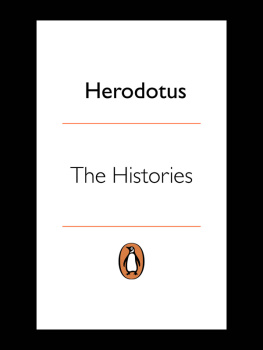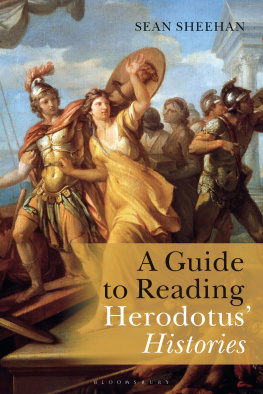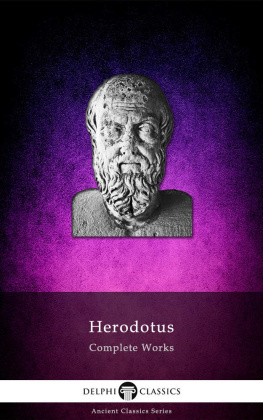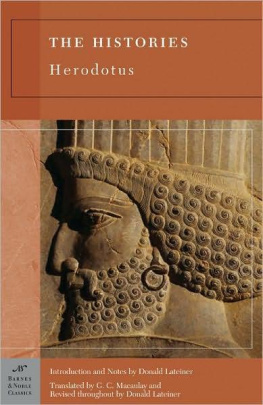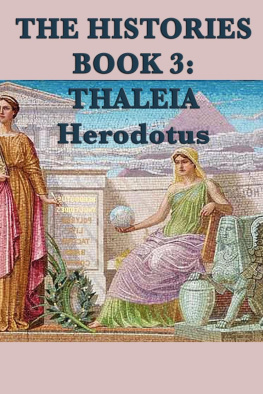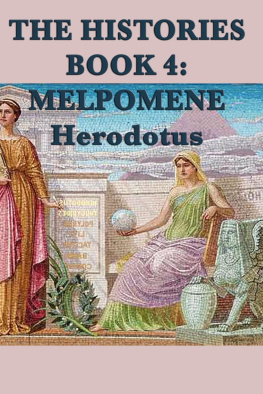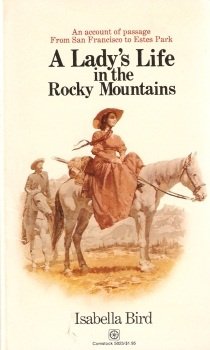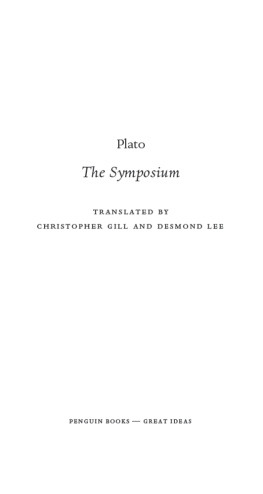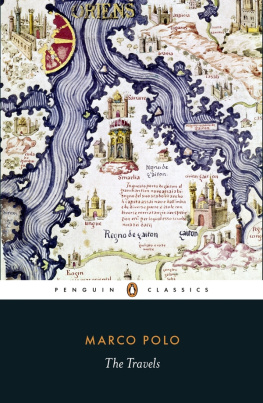Ancient Egypt, c. 415 BC
HERODOTUS
Snakes with Wings and Gold-digging Ants
Translated by AUBREY DE SELINCOURT
Translation revised by JOHN MARINCOLA

PENGUIN BOOKS
Published by the Penguin Group
Penguin Books Ltd, 80 Strand, London WC2R 0RL , England
Penguin Group (USA) Inc., 375 Hudson Street, New York, New York 10014, USA
Penguin Group (Canada), 90 Eglinton Avenue East, Suite 700, Toronto, Ontario, Canada M4P 2Y3 (a division of Pearson Penguin Canada Inc.)
Penguin Ireland, 25 St Stephens Green, Dublin 2, Ireland (a division of Penguin Books Ltd)
Penguin Group (Australia), 250 Camberwell Road, Camberwell, Victoria 3124, Australia (a division of Pearson Australia Group Pty Ltd)
Penguin Books India Pvt Ltd, 11 Community Centre, Panchsheel Park, New Delhi 110 017, India
Penguin Group (NZ), 67 Apollo Drive, Mairangi Bay, Auckland 1310, New Zealand (a division of Pearson New Zealand Ltd)
Penguin Books (South Africa) (Pty) Ltd, 24 Sturdee Avenue, Rosebank, Johannesburg 2196, South Africa
Penguin Books Ltd, Registered Offices: 80 Strand, London WC2R 0RL , England
www.penguin.com
The Histories first published in Penguin Classics 1954
This extract published in Penguin Books 2007
Translation copyright Aubrey de Selincourt, 1954
Revised translation copyright John Marincola, 1996, 2003
All rights reserved
The moral right of the translator has been asserted
Taken from the Penguin Classics edition of The Histories, translated by Aubrey de Selincourt, revised by John Marincola
Except in the United States of America, this book is sold subject to the condition that it shall not, by way of trade or otherwise, be lent, re-sold, hired out, or otherwise circulated without the publishers prior consent in any form of binding or cover other than that in which it is published and without a similar condition including this condition being imposed on the subsequent purchaser
ISBN: 978-0-14-196483-6
Contents
Exiled from Helicarnassus after his involvement in an unsuccessful coup dtat against the ruling dynasty, Herodotus (c. 490415 BC ) undertook some of the many journeys described in his Histories. His reputation has varied greatly, but he is often still known by the title, first given to him by Cicero, of the Father of History.
Vessels of Silver and the Headless Corpse
There are not a great many wild animals in Egypt, in spite of the fact that it borders on Libya. Such as there are both wild and tame are without exception held to be sacred.
[ ]
The various sorts have guardians appointed for them, sometimes men, sometimes women, who are responsible for feeding them; and the office of guardian is handed down from father to child. Their manner, in the various cities, of performing vows is as follows: praying to the god to whom the particular creature, whichever it may be, is sacred, they shave the heads of their children sometimes completely, sometimes only a half or a third part and after weighing the hair in a pair of scales, give an equal weight of silver to the animals keeper, who then cuts up fish (the animals usual food) to an equivalent value and gives it to the animal to eat. Anyone who deliberately kills one of these animals, is punished with death; should one be killed accidentally, the penalty is whatever the priests choose to impose; but for killing an ibis or a hawk, whether deliberately or not, the penalty is inevitably death.
The number, already large, of domestic animals would have been greatly increased, were it not for an odd thing that happens to the cats. The females, when they have kittens, avoid the toms; but the toms, thus deprived of their satisfaction, get over the difficulty very ingeniously, for they either openly seize, or secretly steal, the kittens and kill them but without eating them and the result is that the females, deprived of their kittens and wanting more (for their maternal instinct is very strong), go off to look for mates again. What happens when a house catches fire is most extraordinary: nobody takes the least trouble to put it out, for it is only the cats that matter: everyone stands in a row, a little distance from his neighbour, trying to protect the cats, who nevertheless slip through the line, or jump over it, and hurl themselves into the flames. This causes the Egyptians deep distress. All the inmates of a house where a cat has died a natural death shave their eyebrows, and when a dog dies they shave the whole body including the head. Cats which have died are taken to Bubastis, where they are embalmed and buried in sacred receptacles; dogs are buried, also in sacred burial-places, in the towns where they belong. Mongooses are buried in the same way as dogs; field-mice and hawks are taken to Buto, ibises to Hermopolis. Bears, which are scarce, and wolves (which in Egypt are not much bigger than foxes) are buried wherever they happen to be found lying dead.
The following is an account of the crocodile. During the four winter months it takes no food. It is a four-footed, amphibious creature, lays and hatches its eggs on land, where it spends the greater part of the day, and stays all night in the river, where the water is warmer than the night-air and the dew. The difference in size between the young and the full-grown crocodile is greater than in any other known creature; for a crocodiles egg is hardly bigger than a gooses, and the young when hatched is small in proportion, yet it grows to a size of some twenty-three feet long or even more. It has eyes like a pigs but great fang-like teeth in proportion to its body, and is the only animal to have no tongue and a stationary lower jaw; for when it eats it brings the upper jaw down upon the under. It has powerful claws and a scaly hide, which on its back is impenetrable. It cannot see under water, though on land its sight is remarkably sharp. One result of its spending so much time in the water is that the inside of its mouth gets covered with leeches. Other animals avoid the crocodile, as do all birds too with one exception the sandpiper, or Egyptian plover; this bird is of service to the crocodile and lives, in consequence, in the greatest amity with him; for when the crocodile comes ashore and lies with his mouth wide open (which he generally does facing towards the west), the bird hops in and swallows the leeches. The crocodile enjoys this, and never, in consequence, hurts the bird. Some Egyptians reverence the crocodile as a sacred beast; others do not, but treat it as an enemy. The strongest belief in its sanctity is to be found in Thebes and round about Lake Moeris; in these places they keep one particular crocodile, which they tame, putting rings made of glass or gold into its ears and bracelets round its front feet, and giving it special food and ceremonial offerings. In fact, while these creatures are alive they treat them with every kindness, and, when they die, embalm them and bury them in sacred tombs. On the other hand, in the neighbourhood of Elephantine crocodiles are not considered sacred animals at all, but are eaten. In the Egyptian language these creatures are called champsae. The name crocodile or lizard was given them by the Ionians, who saw they resembled the lizards commonly found on stone walls in their own country.
Of the numerous different ways of catching crocodiles I will describe the one which seems to me the most worthy to report. They bait a hook with a chine of pork and let it float out into midstream, and at the same time, standing on the bank, take a live pig and beat it. The crocodile, hearing its squeals, makes a rush towards it, encounters the bait, gulps it down, and is hauled out of the water. The first thing the huntsman does when he has got the beast on land is to plaster its eyes with mud; this done, it is dispatched easily enough but without this precaution it will give a lot of trouble.
Next page

